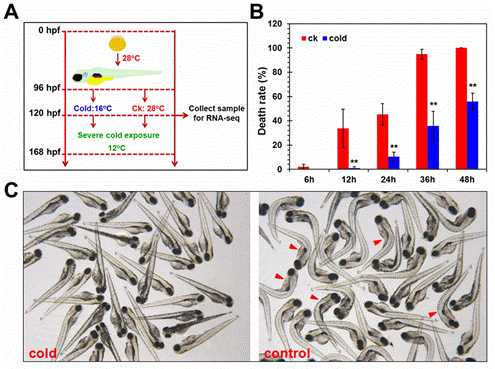 |
| Establishment of cold resistance in zebrafish larvae after pre-exposure to cold stress. (A)Flowchart of cold exposure. Zebrafish embryos were incubated at 28°C from fertilization to 96 hpf. Larvae at 96 hpf were exposed to 16°C for 24 h and the controls were maintained at 28°C. Samples for RNA-seq were collected at 120hpf. The pre-treated and control larvae were further exposed to 12°C for 6, 12, 24, 36 and 48 h. (B) Death rates of pre-treated and control (ck) larvae exposed to 12°C for different times. Data was shown as mean ± standard deviation (n = 4). “**” above error bars indicate p < 0.01. (C) Images of pre-treated and control larvae exposed to 12°C for 36 h. Red arrowheads indicate representative dead larvae. (Image by IHB) |
Exposure to cold stress not only adversely affects the growth and development of fish, but also leads to death under severe situations. The cold tolerance of fishes is mainly determined by genetics, thermal history and developmental stages. Nowadays, an increasing number of studies have been directed towards understanding the mechanisms of cold acclimation in fish. However, the adaptation of larvae to cold stress and the cold-specific transcriptional and post-transcriptional alterations in fish larvae remain largely unknown.
The research group led by Prof. CUI Zongbin at Institute of Hydrobiology, Chinese Academy of Sciences (IHB) investigated the capability of larval zebrafish to establish cold tolerance and the transcriptional and post-transcriptional responses of larval zebrafish to cold stress. They, for the first time, reported that zebrafish possess the ability to develop cold tolerance at early larval stage.
Researchers found that pre-exposure of 96-hpf (hours post fertilization) zebrafish larvae to 16 oC for 24 h significantly decreased death rate upon severe cold stress at 12 oC, indicating the ability of larval zebrafish to form cold tolerance under mild cold stress. RNA-seq analyses identified 1431 and 399 genes up-regulated and down-regulated by cold stress, respectively. Bioinformatic analyses revealed that genes up-regulated by temperature stress are mainly involved in biological process including RNA splicing, ribosome biogenesis, protein catabolic process and RNA transport.
Since RNA-seq allows the analyses of genome-wide transcription, a lot of alternative splicing and alternative promoter usage events regulated by cold stress were also identified. These findings provide important clues for further investigating mechanisms of cold signal transduction and functions of master genes in cold acclimation of fish.
The research findings were published online in BMC genomics with the title "Transcriptomic characterization of cold acclimation in larval zebrafish". This work was supported by grants from the Strategic Priority Research Program--Innovation systems of molecular module design breeding of the Chinese Academy of Sciences and the National Natural Science Foundation.







